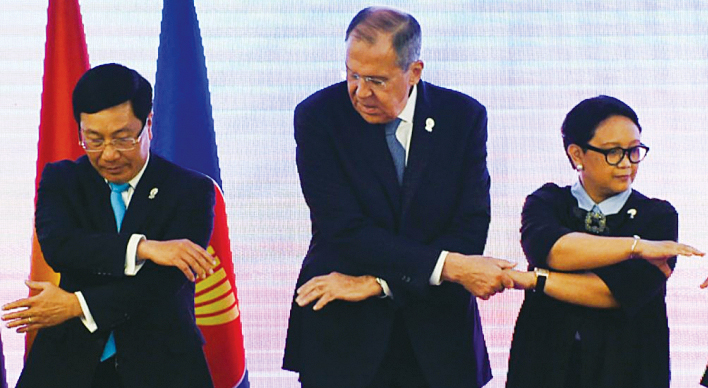ANN: The unusually great number of heavy hitters like Russia, China, Japan, South Korea in Asean mee

At first glance, the Association of Southeast Asian Nations (ASEAN) Foreign Ministers’ Meeting taking place in Bangkok this week does seem to have a familiar agenda.
Issues like regional economic integration, member-states’ diplomatic concerns and combating climate change are being thrashed out behind closed doors as per usual.
What is unusual about the meeting, though, is the number of foreign dignitaries attending – seats that traditionally were empty or filled with aids and assistants are being occupied by heavy hitters from Russia, China, Japan, South Korea, the US and beyond.
US-China Trade War
Among those attending the meetings and holding closed-door bilaterals with the region’s ministers is Chinese Foreign Minister Wang Yi.
With Beijing involved in a long drawn-out economic war of attrition with the United States, Southeast Asia has become China’s second-largest trading partner (behind only the European Union) and an economic alternative to Washington’s protectionism.
The region is eager for Chinese investment, funds for infrastructure development and tourists.
While Beijing is currently embroiled in an ongoing dispute with the Philippines and Vietnam over the South China Sea, Wang is making conciliatory remarks about the need to cooperate to find a solution.
“We are ready to continue to work with Asean to build on the progress we have made in our cooperation and enhance mutual political trust,” Wang said at a press conference on Wednesday.
Wang met separately with the ministers from the Philippines and Vietnam and undoubtedly stressed Beijing’s increasing investment in both countries.
It is anyone’s guess if Vietnam’s recent SOS to India for support against China, which it accused of “violating its sovereignty ”, figured in the discussions but feelings were obviously assuaged.
The Chinese Foreign Minister also took time to meet with Indonesia’s foreign minister and stressed that Beijing was ready to back Southeast Asia’s largest economy both in terms of infrastructure development as well as trade.
Brexit
British Foreign Minister Dominic Raab, appointed just last week to Boris Johnson’s pro-Brexit Cabinet, also travelled to Bangkok.
With the United Kingdom set to leave the European Union by October deal or no deal, according to the new British Prime Minister Boris Johnson, Raab is reaching out to new trading partners across the world.
China has already made overtures to Downing Street about opportunities and investments and Raab’s visit to Southeast Asia will focus on courting more potential trade partners.
In a statement released before his trip, Raab argued that “…for too long our trade focus has been on Europe…we need to expand our horizons.”
Asean already accounts for $43.8 billion in annual trade with the United Kingdom and Raab’s bilateral with each member state was clearly geared towards upping that figure significantly.
Russia
With Russia’s 2019 GDP growth slowing to less than 1%, Foreign Minister Sergey Lavrov was in Bangkok building relationships with his regional counterparts and meeting with allies. Like in the UK, a slowdown in global trade has seen Russia meet with countries outside its traditional net of trade partners in the hope of boosting its economy.
Historically, Russia’s main source of trade with the region is the export of arms and expertise; Lavrov will be hoping that Russian goods and energy too will find ready buyers in the fast-developing region.
Japan-Korea Tensions & The US
Also joining Lavrov and Wang Yi in Bangkok was US Secretary of State Mike Pompeo.
Pompeo has not been in the region since the failed meeting in Hanoi between President Donald Trump and North Korean leader Kim Jong-un.
But while Pompeo’s counterparts focused on economic initiatives, it seems Pompeo was more concerned with repairing a regional alliance his administration has arguably helped fray.
Pompeo said he hoped to help mend Japan-South Korea relations.
An export ban by Japan on high tech components to South Korea has put the two US allies in North East Asia on a collision course.
“We will encourage them to find a path forward,” Pompeo told reporters, according to Reuters.
“They’re both great partners of ours. They’re both working closely with us in our effort to denuclearize North Korea. So, if we can help them find a good place, that’s certainly important for the United States.”
The South Korean and Japanese Foriegn Ministers are also scheduled to hold talks in Bangkok – their first face-to-face meeting since Tokyo implemented the export restrictions on 4 July.
A three-way meeting with the US to discuss Washington’s reported ‘standstill agreement’ proposal is also on the cards.
https://asianews.network/2019/08/01/world-powers-converge-on-bangkok-as-asean-presents-opportunities-challenges/
